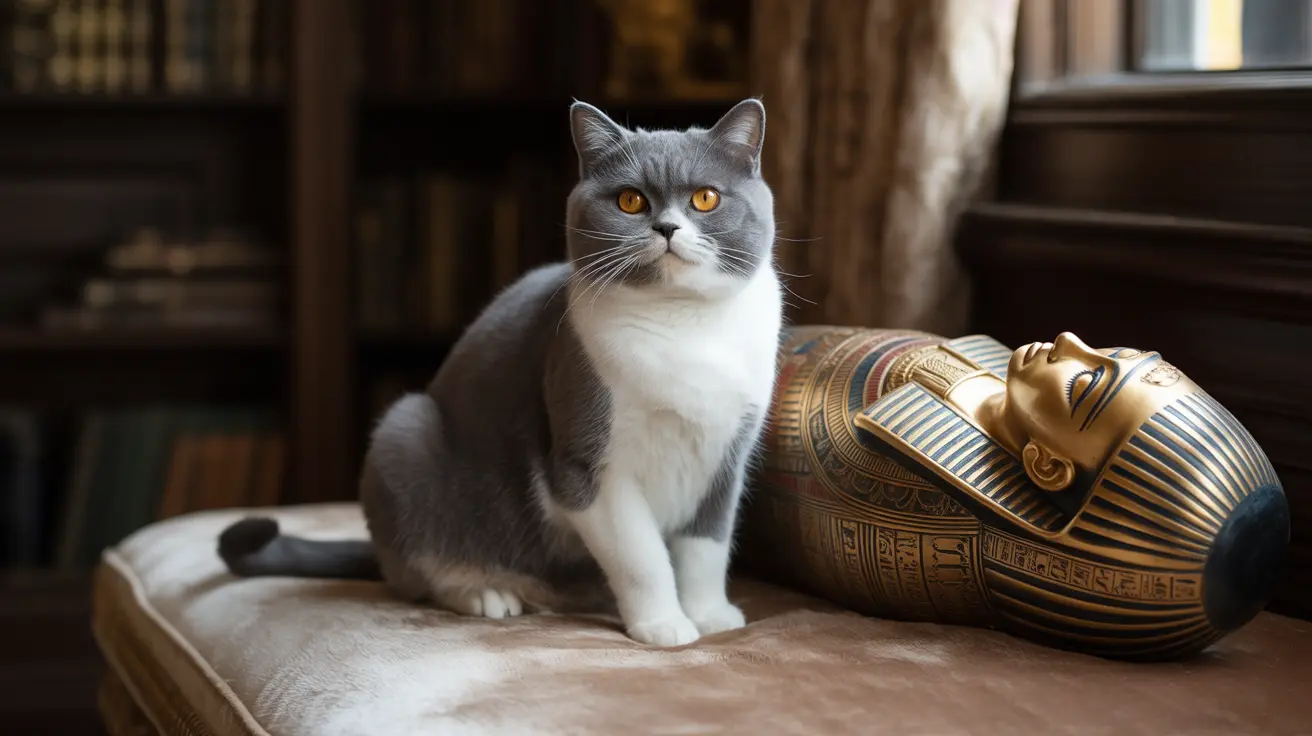Ancient Egyptian Origins
The earliest documented evidence of tuxedo cats comes from Ancient Egypt, where these elegant felines were prominently featured in artwork and hieroglyphics. Remarkably, approximately 70% of cats depicted in ancient Egyptian artifacts showcase the distinctive tuxedo pattern, highlighting their significant presence in one of history's most advanced early civilizations.
Ancient Egyptians didn't just admire tuxedo cats for their striking appearance; they considered them sacred beings and powerful symbols of good fortune. These cats were so highly regarded that they were often mummified and entombed alongside their human companions, ensuring their bond continued into the afterlife.
The Genetic Story Behind the Tuxedo Pattern
The iconic tuxedo appearance isn't actually a breed characteristic but rather a specific coat pattern resulting from unique genetic combinations. This distinctive look is created by the interaction between the white spotting gene and a recessive allele of the agouti gene, which creates the classic black-and-white bicolor pattern.
Unlike some color patterns in cats (such as calico, which is predominantly found in females), the tuxedo pattern occurs equally in both male and female cats. This genetic pattern can appear in numerous cat breeds, from domestic shorthairs to pedigreed varieties.
Cultural Significance Across Civilizations
Beyond Ancient Egypt, tuxedo cats have held special status in various cultures throughout history. In Japanese folklore, these cats are considered powerful symbols of good fortune and prosperity. This belief has persisted into modern times, with many cultures still considering tuxedo cats to be particularly lucky pets.
Throughout history, tuxedo cats have been companions to numerous notable figures, including Beethoven, William Shakespeare, and Sir Isaac Newton. In more recent times, they've even made their mark in politics, with perhaps the most famous example being Socks, President Bill Clinton's beloved White House cat.
Modern Day Tuxedo Cats
Today, tuxedo cats continue to charm their way into homes worldwide. Their distinctive appearance, combined with their typically friendly and intelligent nature, makes them popular pets. Many owners report their tuxedo cats displaying what's affectionately termed "tuxitude" - a combination of intelligence and personality that seems unique to these black-and-white beauties.
These cats have also left their mark on popular culture, appearing in various forms of media. From Sylvester the Cat to Felix the Cat, tuxedo cats have become iconic characters in entertainment, further cementing their place in modern society.
Frequently Asked Questions
Where do tuxedo cats originally come from and what is their historical significance?
Tuxedo cats have their earliest documented origins in Ancient Egypt, where they appeared in approximately 70% of feline artwork and were considered sacred animals. They held great religious and cultural significance, often being mummified and entombed with their owners.
Are tuxedo cats a specific breed or just a color pattern in cats?
Tuxedo cats are not a specific breed but rather a color pattern that can occur in many different cat breeds. The pattern is characterized by a primarily black coat with white markings on the chest, paws, and sometimes face.
What genes cause the distinctive black-and-white tuxedo pattern in cats?
The tuxedo pattern is caused by the interaction between the white spotting gene and a recessive allele of the agouti gene. This genetic combination creates the distinctive black-and-white bicolor pattern characteristic of tuxedo cats.
Why were tuxedo cats considered lucky or special in ancient cultures like Egypt and Japan?
In Ancient Egypt, tuxedo cats were considered vessels for gods and goddesses, particularly Bastet. In Japanese culture, they were seen as bringers of good fortune and prosperity. These beliefs stemmed from their striking appearance and observed intelligence.
Do tuxedo cats have unique personality traits compared to other domestic cats?
While personality varies by individual cat, tuxedo cats are often reported to be intelligent, sociable, and curious. Many owners describe them as having "tuxitude" - a distinctive combination of confidence and charm. However, these traits are not scientifically proven to be unique to tuxedo cats.






